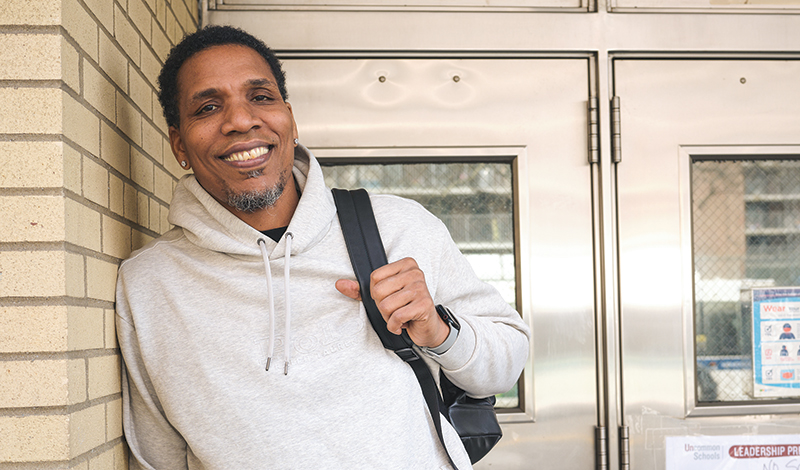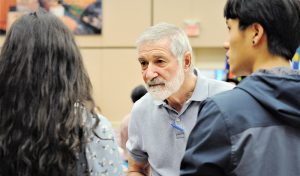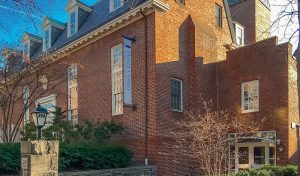Living Buddhism sat down with Ulyses Moran, of Brooklyn, New York, an guidance counselor at a transfer high school for kids who need extra support to graduate.
Living Buddhism: Thank you, Ulyses, for discussing with us how you apply the concept of humanistic education to your work. What motivated you to go into education?
Ulyses Moran: I’ve always wanted to inspire young people. I grew up in Brooklyn in the ‘80s and was constantly beat up. I was always the tallest kid, eventually reaching 6 feet 8 inches, so the bullies picked on me to show that no one could mess with them. I struggled with suicidal thoughts. My mom was chanting a lot for my safety. When I was 15, my math teacher was worried for me and helped me transfer to a school in Wisconsin, where I excelled in basketball. These experiences have helped me relate to the struggles of youth.
I eventually landed in Europe after graduation and played pro basketball for 15 years in places like Croatia, Turkey and Spain.
When I retired in 2008, I began chanting about my next mission. I eventually got hired by the New York City Board of Education as a guidance counselor.
Can you describe your work?
Ulyses: I work at a transfer high school for kids who need extra support to graduate. Most of the students are from single-parent homes where they’re raising themselves. People don’t often listen to what they have to say. I feel my job is to fill that void and provide a compassionate ear.
Each morning, I stand at the entrance and greet them with joy. Throughout the school day, I’m in the hallway, seeing them off to class. The students will stop me to talk about their problems. I don’t have an office or desk. We talk then and there. They may tell me how they hate this person or that person. I explain how we are put in situations to change them and break the cycle of hate. And that’s how they can make their mark in this world: by transforming these situations, turning poison into medicine.
What does humanistic education mean to you in this context?
Ulyses: Through my practice, I try to touch the heart of every student I come across. I always think back to Ikeda Sensei’s experience in October 1960 in Chicago, when he chased after a Black boy who fled in humiliation after he wasn’t allowed to play ball with other kids because of his color.
Sensei vowed to that boy in his heart: “I promise you that I will build a society truly worthy of your love and pride” (The New Human Revolution, vol. 1, p. 161). I strive to embody this same vow in my school, and believe in the Buddha nature of each young person.
We understand that you try to impart Buddhist principles to them.
Ulyses: It’s been so profound exposing them to our philosophy of peace and showing them an example of how human harmony is possible.
They often see me with either the Living Buddhism or one of Sensei’s books and ask me about what I’m reading. When I naturally tell them about the Buddhist philosophy of peace, they’ll ask me things like, “Don’t you get mad at people?” I’ll respond, “Of course, that’s human nature, but chanting Nam-myoho-renge-kyo puts me in a state of mind where I don’t want a negative outcome and can stop the cycle of conflict or violence.”
In March, I even brought a group of students to a youth meeting. I wasn’t aware at the time that two of them were in the middle of a bad conflict. But during the meeting, they put their differences aside and when they came out, one was holding the other’s baby, and they were talking to each other like sisters. I almost cried. I’m striving to bring out the potential in these youth.
One aspect of Soka education is the teacher and student growing together. Have you experienced this?
Ulyses: Absolutely. The students constantly make me look at my own life. Several years ago, I was reflecting on how I was encouraging them to finish their education, when I hadn’t completed my bachelor’s degree. I decided I needed to guide them by example, and in 2016, at 45 years old, I finally finished my bachelor’s degree. I wanted to show them that setbacks in life don’t define who you are. You can narrate your own story.
What would you say to fellow educators struggling with their students?
Ulyses: Listen, really listen to each child and put yourself in their situation. Just like any human relationship, I think of how I would use my Buddhist practice to understand them and support them. I feel like I have 200 young lives in my hands, and I need to prepare them to be happy and create value in the world.
Also, I chant one hour every morning for the students. In the evening, I chant more to reflect on the things I want to change and how to better get my message across. At the beginning of this year, I asked them to write down their goals for the year, so I chant for each of them every day to ensure their happiness and victory.
You are reading {{ meterCount }} of {{ meterMax }} free premium articles





